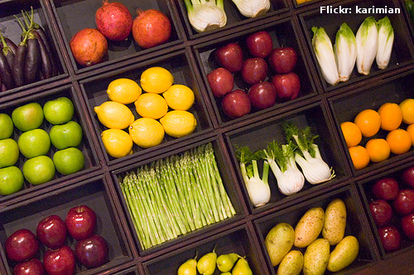The health benefits of eating more plant food are well known. Eating plant food, such as vegetables, fruit, whole grains, and legumes make your body healthy. It can reduce your opportunity to have a disease, such as cancer, heart disease, stroke, obesity, diabetes, hypertension, and so on.
Eating plant food also have a rule. A healthy plant-based diet must be taken to balance your diet. Here is the characteristics of plant-based diet:
Eating plant food also have a rule. A healthy plant-based diet must be taken to balance your diet. Here is the characteristics of plant-based diet:
- At least 7 to 9 servings of fruits and vegetables per day. If you are trying to cut calories to make a weight loss, eat more vegetables and less fruit.
- Eat dark green leafy and cruciferous vegetables daily. Try to include a wide variety--broccoli, spinach, kale, chard, mustard greens, collard greens, and others.
- Eat dark and brightly colored berries every day or at least several times per week. Try to include a wide variety--blueberries, blackberries, strawberries, dark red cherries, raspberries, and others.
- Eat at least 2 to 3 servings per day of whole grains. Read the label. If you see the word "enriched," it's not a whole grain.
- Focus on replacing unhealthy fats with healthy fats. For example, cut back on the unhealthy fats found in processed foods, such as chips, crackers, cookies, cakes, microwave and instant meals, and fast food. Instead eat foods that contain healthy fats such as nuts, seeds, fish, olive oil, and canola oil.
- Use meat, chicken, pork, and other animal foods for flavoring, rather than as the main focus of your meal.
- Eat beans (legumes) every day or at least several times per week. You can enjoy beans in soups, salads, chilis, burritos, pasta, and many other dishes.
- Eat a little yogurt or other "fermented" foods at least a few times per week. These contain healthy bacteria, called probiotics, that aid digestion and improve immune function.
- Drop the salt habit. Instead, enjoy the flavors of a wide variety of herbs, such as garlic, onions, rosemary, sage, thyme, oregano, celery seed, ginger, cumin, turmeric, caraway, mint, dill, lemongrass, cardamom, fennel, and fenugreek. Just like other plant foods, many herbs and spices have cancer-fighting properties.
- Focus on variety in all aspects of your diet. Eat green, red, yellow, orange, purple, and white foods. Think leafy greens; red peppers and strawberries; squash and lemons; carrots, oranges, and sweet potatoes; blueberries, purple cabbage, and eggplant; and cauliflower, garlic, and onions. The more color and variety, the better.
How much fiber do you need? For men, age 50 and younger, you need 38 grams each day. Age 51 and older, you just need 30 grams each day. For women, age 50 and younger, you need 25 grams each day. Age 51 and older, you just need 21 grams each day.
At first, it might seem overwhelming to try to eat all of these plant foods. But, by making small changes over time and building on your successes with healthful eating, you can move your diet in the right direction without feeling deprived. Also, high-fiber foods are good for your health. But adding too much fiber too quickly can promote intestinal gas, abdominal bloating and cramping. Increase fiber in your diet gradually over a period of a few weeks. This allows the natural bacteria in your digestive system to adjust to the change.
This is not a quick-fix or a temporary diet. It is a healing lifestyle. Learn to think about food in a whole new way and you can use it to nourish your whole self--body and soul. So, manage and well-balanced food is the best medicine in the world.


 RSS Feed
RSS Feed